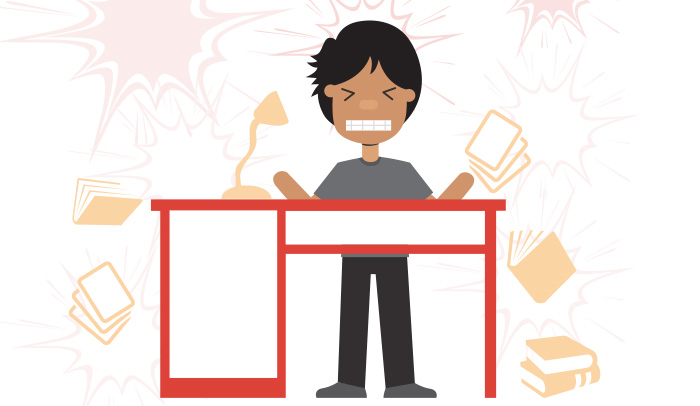Struggling to stay motivated? Strengthen your internal locus of control
Reading Time: 6 minutes The events of this year are enough to crush anyone’s drive. So how can you stay motivated this school year? Read this article to learn some tips.
Reading Time: 6 minutes The events of this year are enough to crush anyone’s drive. So how can you stay motivated this school year? Read this article to learn some tips.
Rate this article and enter to win
If exam season is approaching, your class notes may be piling up and your calendar becoming crammed with study sessions and finals. Pressure? Ever feel like it’s too much? “We do need some stress sometimes for us to perform our best, but too much stress can become exhausting and make you unable to function. You may not be able to recall facts or apply your knowledge analytically,” says Dr. Laura Offutt, an internal medicine physician and the founder of Real Talk with Dr. Offutt, an interactive health and wellness website. The good news: You are not helpless. If stress is the villain that’s bringing you down, resilience is the hero that’s cheering you on. Here’s how to manage your stress, keep calm, and study (and play) on.

Adrenal glands release stress hormones:
The adrenal glands produce “fight or flight” hormones. In some situations (e.g., when a tornado is heading your way) these can potentially save your life. These hormones get your body mobilized for action in order to survive (dodge that tornado).
In other situations (e.g., exam nerves) they are not so helpful—more of an overreaction. Your body doesn’t use that extra jolt of energy. Instead of earning tornado survival bragging rights, you’re at risk for the negative side effects of extended stress.
Epinephrine (adrenaline), a hormone, enters your bloodstream and circulates through your body. Here’s what it does:
Cortisol, a hormone, gets your body mobilized and ready for action in order to survive. But in many cases (e.g., exam prep) this cortisol is not so useful. Elevated cortisol levels for an extended period of time can:
The amygdala, a part of the brain that is key to emotional processing, sends a distress signal to the hypothalamus.
The hypothalamus, a part of the brain that regulates hormones and controls body functions, relays that distress signal via the autonomic nervous system. This manages involuntary body functions such as breathing and blood pressure.
Deep abdominal breathing engages the vagus nerve, which signals to slow down the heart rate, lower the blood pressure, and put the brakes on cortisol.
“When I feel overwhelmed or stressed, I go outside and find a spot where I can just breathe and clear my mind.”
—Stephanie G., fourth-year undergraduate, California State University, Stanislaus
Mindfulness & meditation are powerful tools for reducing stress hormones and boosting emotional resilience in demanding situations.
Set aside 10–15 minutes a day. Focus on taking deep breaths and recognizing which areas of your body are holding tension. For regular tips and guidance, see Mind your mind, a monthly series on our BetterU pages.
+ Mindfulness for college students
“Using mindfulness techniques has helped me manage my procrastination. It has allowed me to really understand and analyze the situations I am in. For example, if I know my schedule for the upcoming week is going to be especially rough, then I’ll try to finish as much work as I can earlier.”
—Matthew S., second-year undergraduate, Santa Clara University, California
Physical activity channels cortisol productively.
Cardio workouts and competitive sports will do the job.
Low-intensity activities (e.g., tai chi and yoga) work too:
Fluid movement + deep breathing + mental focus = calm
“Exercise helps clear your head and makes it easier to sit and stay focused mentally. Choose whatever activity you love. It doesn’t have to be training for a triathlon or an hours-long workout. It can be going for a walk, playing Dance Central, or shooting hoops.”
—Dr. Laura Offutt, creator of Real Talk with Dr. Offutt, an interactive health website for teens
Student stories
“I personally use exercise as a de-stressor! You’ll find me more at the gym during exam time.”
—John Handal, fourth-year undergraduate, Redeemer University College, Ontario
“Jogging alone while listening to music at night can really calm you down too.”
—Reza Wang-Lotfi, second-year undergraduate, New Jersey Institute of Technology
Laughter and joy channel cortisol productively.
Making time for fun could actually improve your exam score. On weekends, make time to go to a funny movie or a live comedy show with friends. Even the anticipation of a good joke can start to lower stress hormones, according to a 2008 study in the Journal of the Federation of American Societies for Experimental Biology.
Music is uplifting. You knew this anyway, but a 2003 study in Neuroendocrinology Letters showed that listening to music lowers cortisol and stress levels.
Taking an hour before bed without cramming lets your brain and body slow down. If you get antsy, try reading (no textbooks!).
Student stories
“I recommend an hour of downtime before bed, such as listening to relaxing music (a symphony/orchestra).”
—Amy Neilson, fourth-year undergraduate, Western Washington University
“I find that if I am stressing about an exam or something else school-related, the best way for me to relax at night is to lie in bed and listen to a meditation that lasts for 30 minutes to an hour. They are easily found on YouTube, and they’re great for relaxing when you find reading doesn’t help.”
—Laura Barr, second-year undergraduate, Memorial University of Newfoundland
Laughter and joy channel cortisol productively.
Making time for fun could actually improve your exam score. On weekends, make time to go to a funny movie or a live comedy show with friends. Even the anticipation of a good joke can start to lower stress hormones, according to a 2008 study in the Journal of the Federation of American Societies for Experimental Biology.
Music is uplifting. You knew this anyway, but a 2003 study in Neuroendocrinology Letters showed that listening to music lowers cortisol and stress levels.
Taking an hour before bed without cramming lets your brain and body slow down. If you get antsy, try reading (no textbooks!).
Student stories
“I recommend an hour of downtime before bed, such as listening to relaxing music (a symphony/orchestra).”
—Amy Neilson, fourth-year undergraduate, Western Washington University
“I find that if I am stressing about an exam or something else school-related, the best way for me to relax at night is to lie in bed and listen to a meditation that lasts for 30 minutes to an hour. They are easily found on YouTube, and they’re great for relaxing when you find reading doesn’t help.”
—Laura Barr, second-year undergraduate, Memorial University of Newfoundland

“People who are successful at reducing the negative effects of stress have a variety of tried-and-true techniques. This helps keep their techniques effective over time, and covers different environments and situations,” says Steve Lux, senior health educator at Northern Illinois University.
Your personal “black bag” can include strategies that are effective indoors or out, any time the year, at no cost, and that address either your physical or emotional needs (or both).
Rate this article and enter to win
As a student, you’re probably pretty familiar with stress. You might also have wondered why some of your peers on campus seem to handle their challenges relatively easily while others struggle to meet similar demands. That difference relates to resilience, or grit: the ability to overcome and draw strength from difficult situations. “At our most resilient, we can surf the waves of change and stress rather than being swamped and drowned by them,” says Dr. Holly Rogers, a psychiatrist at Duke University.
In recent years, researchers have identified protective factors and processes that help individuals cope and explored how those can be nurtured. “A large number of people do not develop the problems we would expect them to have [after serious adversity]. We have for 50 years been interested in explaining what makes the difference,” says Dr. Michael Ungar, founder and co-director of the Resilience Research Centre at Dalhousie University, Nova Scotia.
“Resilience skills can help students not just get through college but actually thrive and flourish while doing it,” says Paula Davis-Laack, who designs resilience training programs for professionals and organizations. “Resilience skills bring out the best qualities in a person and activate desirable behaviors. Resilient students can tolerate change, stress, uncertainty, and other types of adversity more effectively. They are less likely to experience setbacks and diminished work/school performance, ‘learned helplessness,’ and other problems.”
“Resilience has been very conclusively shown to be a bundle of skills that everyone can learn, develop, and practice. One of the leading researchers calls resilience ‘ordinary magic,’ because it doesn’t require anything fancy or sophisticated to build,” says Davis-Laack. External supports matter too, including “the capacity of the institution to create opportunities for students to succeed,” says Ungar.
How does your resilience rate? Test yourself
Early life experiences have long-term implications. People who go through adverse childhood experiences—like childhood abuse, witnessing violence against their mother, or living with a substance abuser—are at higher risk for alcohol and drug abuse, depression, and other health conditions, according to an influential study published in the American Journal of Preventive Medicine in 1998, and ongoing research.
Other childhood risk factors include:
Most children who grow up in difficult circumstances develop into well-adjusted and successful adults. Why? In part, because certain protective factors can offset the challenges.
Protective factors for resilience include:
This is both true and false.
Mild and moderate adversity can help build coping skills, according to research. More than 8 out of 10 students surveyed by Student Health 101 said they had experienced a challenging experience or situation that made them a better person.
Severe adversity is a different story, and there are risks in assuming that any suffering makes us stronger. “By perpetuating the belief that pain is edifying, we place the onus on survivors to heal themselves—and we deemphasize the value of prevention and support services,” pointed out a columnist in the Washington Post in January. The growth potential lies in working with others to overcome trauma, specifically giving and receiving help.
Even in everyday circumstances, resilience makes a difference. In a 2010 study of medical students, the resilient students:
Your school can help build your resilience
“A student’s resilience is not just the individual’s capacity to cope. It is also the capacity of the institution to create opportunities for students to succeed. So when Carleton University [in Ontario] noticed that a lot of their first year students felt lonely or disconnected to the university, they began creating cohorts of 100 students who all take classes together. The students felt better supported and made friends, [which] predicted better coping when first-year stressors piled up.” —Ungar
| What happened | Why it happened | What it means to me | How I can have more of it |
| 1. Cooked huge pot pie with Karen | Finished assignment in advance, made time for relaxing and socializing | Healthier food, fun company, all set for 3 more dinners this week | Invite Rhodri to cook with me next weekend |
| 2. Good grade on my research paper | Created a plan to complete my paper over a week instead of trying to do it all in one night | Feeling proud, less anxious, more in control | Create a study plan for every assignment |
| 3. Got invited to a party | Got to know Dana in class | Great time. I have more friends then I thought, and a new Zumba partner | Chat more with classmates etc. |